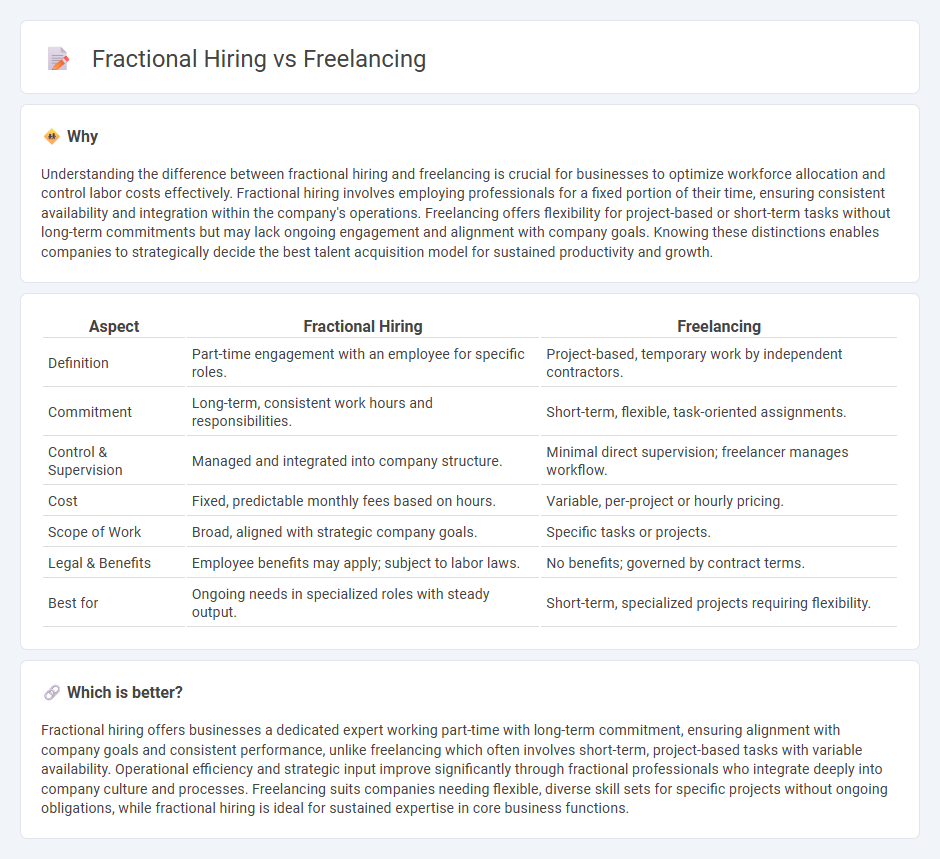
Fractional hiring offers businesses part-time access to specialized professionals who integrate into the company's structure for ongoing projects, ensuring consistent expertise and strategic alignment. Freelancing typically involves independent contractors working on short-term, task-specific assignments without long-term commitments or integration within the organization. Explore the distinct advantages and applications of fractional hiring versus freelancing to optimize your workforce strategy.
Why it is important
Understanding the difference between fractional hiring and freelancing is crucial for businesses to optimize workforce allocation and control labor costs effectively. Fractional hiring involves employing professionals for a fixed portion of their time, ensuring consistent availability and integration within the company's operations. Freelancing offers flexibility for project-based or short-term tasks without long-term commitments but may lack ongoing engagement and alignment with company goals. Knowing these distinctions enables companies to strategically decide the best talent acquisition model for sustained productivity and growth.
Comparison Table
| Aspect | Fractional Hiring | Freelancing |
|---|---|---|
| Definition | Part-time engagement with an employee for specific roles. | Project-based, temporary work by independent contractors. |
| Commitment | Long-term, consistent work hours and responsibilities. | Short-term, flexible, task-oriented assignments. |
| Control & Supervision | Managed and integrated into company structure. | Minimal direct supervision; freelancer manages workflow. |
| Cost | Fixed, predictable monthly fees based on hours. | Variable, per-project or hourly pricing. |
| Scope of Work | Broad, aligned with strategic company goals. | Specific tasks or projects. |
| Legal & Benefits | Employee benefits may apply; subject to labor laws. | No benefits; governed by contract terms. |
| Best for | Ongoing needs in specialized roles with steady output. | Short-term, specialized projects requiring flexibility. |
Which is better?
Fractional hiring offers businesses a dedicated expert working part-time with long-term commitment, ensuring alignment with company goals and consistent performance, unlike freelancing which often involves short-term, project-based tasks with variable availability. Operational efficiency and strategic input improve significantly through fractional professionals who integrate deeply into company culture and processes. Freelancing suits companies needing flexible, diverse skill sets for specific projects without ongoing obligations, while fractional hiring is ideal for sustained expertise in core business functions.
Connection
Fractional hiring and freelancing both offer flexible workforce solutions that allow companies to access specialized skills without committing to full-time employment. Fractional hiring typically involves bringing on professionals part-time to fill strategic roles, while freelancing encompasses project-based or short-term engagements with independent contractors. This connection enables businesses to optimize talent acquisition, reduce costs, and scale teams efficiently according to fluctuating demands.
Key Terms
Flexibility
Freelancing offers unparalleled flexibility by allowing businesses to engage professionals on a project-by-project basis, adapting quickly to changing workloads without long-term commitments. Fractional hiring provides specialized expertise with a steady, part-time engagement, ensuring consistent contribution and integration into company culture while still maintaining flexibility in resource allocation. Explore the advantages of each approach to determine the best fit for your company's evolving needs.
Commitment
Freelancing offers project-based flexibility with minimal long-term commitment, ideal for short-term needs or specific tasks. Fractional hiring involves engaging professionals for part-time roles within a company, ensuring consistent dedication and integration into the business over an extended period. Explore how commitment levels affect your workforce strategy to make the best hiring decision.
Scope of Work
Freelancing offers flexible, project-based Scope of Work with defined tasks and deliverables tailored to short-term needs, often requiring minimal integration with company processes. Fractional hiring involves part-time engagement of specialized professionals managing broader responsibilities, including strategic planning and ongoing operational roles within an organization. Explore the detailed differences to determine the best fit for your business objectives.
Source and External Links
Freelancing 101: What is Freelancing? - Freelancing is a form of self-employment where individuals work independently for multiple clients without exclusive ties to any company, offering flexibility in work time and location, and leveraging diverse skills for various freelance roles.
What Is Freelancing? Basics and Popular Jobs in 2025 - Freelancing means doing specific client work without full-time employment, involving picking a niche, building a portfolio, setting rates, maintaining clear communication, and managing taxes, all as a self-employed individual.
25 best freelance websites to find work in 2025 - Freelancing offers freedom to work independently and choose clients, with beginners able to start part-time, build their brand and portfolio, and find jobs through top freelance platforms like Fiverr and Freelancer.com.
 dowidth.com
dowidth.com